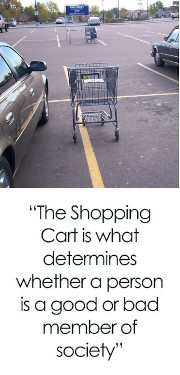|
Home
|
Apr 4, 2022
This week’s themeWords from chemistry This week’s words litmus test flashpoint chain reaction borax boiling point 
The shopping cart is what determines whether a person is a good or bad member of society.
Image: Bored Panda Previous week’s theme Clothes A.Word.A.Day
with Anu GargI loved physics in high school, but chemistry wasn’t my favorite. Memorizing chemical symbols and valences. Mixing acrid stuff in test tubes. Chemistry does good things though. “Better living through chemistry,” they claim, and it’s possible unless profit motive takes over and they start recommending you wrap your baby in cellophane. Now, you don’t have to pick a favorite for the cellophane love, wrap them both! Wait, prices have gone down. You can treat up to three kids for the same low price. It’s not known why the company stopped at three kids and then why they stopped running these lovely ads altogether. Probably for the same reason they stopped dumping sludge near communities. In their defense, they were experts in chemistry, not biology. How’d they know what happens to babies tightly wrapped in cellophane? Or maybe running those ads showing cellophaned-kids was a public-service announcement -- a helpful suggestion on how the community could protect itself from the toxic matter the company dumped around them. At any rate, let’s just say the chemistry between the company and the community wasn’t that great. Back to language. Language is a funny thing. A software engineer does software, a dishwasher does dishes, and a chemist does chemicals. In British English, this person also does drugs. That doesn’t sound right either. Let’s try again. In British English, a chemist is one who experiments with chemicals and sells drugs. Hmm, this is breaking bad. Maybe we should give up the language and do chemicals instead. That’s what we’ll do, this week at least. We’ve picked five words from the world of chemistry that are also used metaphorically. We’re taking appropriate precautions, so you can relax -- no need for goggles and gloves. And definitely do not wrap yourself in cellophane. Are you a chemist, of any kind, in any language? What is it like to be in your shoes? Share on our website or write to us at words@wordsmith.org. No caustic comments, please. litmus test
PRONUNCIATION:
MEANING:
noun: 1. A test in which a single indicator prompts the decision. 2. A test to determine if a solution is acidic or alkaline. ETYMOLOGY:
From Old Norse litmosi (dye-moss), from litr (dye) + mosi (moss).
Earliest documented use: 1824.
NOTES:
Litmus paper turns red when dipped in an acidic solution and blue when
in alkaline. It’s a quick and easy test to determine the type of solution
one has. Litmus is derived from moss and has been around since approx. 1300
CE. Eventually, the term litmus test came to be used figuratively, for
example, for a test to determine suitability of a candidate for the US
Supreme Court. For example, some senators would vote yes or no depending on
whether a candidate supports or opposes abortion rights.
USAGE:
“People are always saying you need to take a vacation with someone before
you can really determine whether the relationship has any longevity.
They are wrong. ... No, dear readers, shopping at Costco is the
relationship litmus test.” Ammi Midstokke; Couple Survives Costco Ordeal; Spokesman Review (Washington); Feb 3, 2022. “Niobe was not a metaphor for a litmus test, she was a litmus test. Straight men turned colors in her presence.” Larry Beinhart; The Librarian; PublicAffairs; 2004. See more usage examples of litmus test in Vocabulary.com’s dictionary. A THOUGHT FOR TODAY:
Perhaps travel cannot prevent bigotry, but by demonstrating that all
peoples cry, laugh, eat, worry, and die, it can introduce the idea that if
we try and understand each other, we may even become friends. -Maya
Angelou, poet (4 Apr 1928-2014)
|
|
Subscriber Services
Awards | Stats | Links | Privacy Policy
Contribute | Advertise
Awards | Stats | Links | Privacy Policy
Contribute | Advertise
© 1994-2026 Wordsmith